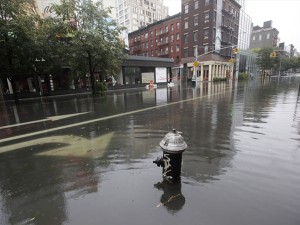
WATERWORLD. Grand St. and West Broadway in the Soho neighborhood of Manhattan is flooded, Sunday, Aug. 28, 2011 in New York. Seawater surged into the streets of Manhattan on Sunday as Tropical Storm Irene slammed into New York, downgraded from a hurricane but still unleashing furious wind and rain. The flooding threatened Wall Street and the heart of the global financial network. (AP Photo/Mary Altaffer)
NEW YORK — The opening bell at the New York Stock Exchange will ring on time Monday.
Operators of the historic Big Board and other major U.S. exchanges said they plan to open for trading as usual. Their announcements came after city officials said damage from Tropical Storm Irene wasn’t as severe as feared in New York’s financial district.
How all the people who work at the exchanges and related businesses in New York will make it to work remained a puzzle late Sunday. Limited bus service resumed in Manhattan and the Bronx Sunday evening, but it wasn’t clear the city’s subways and buses would be running normally in time for Monday’s morning commute. And flooding and downed trees obstructed tracks throughout the commuter rail systems that bring workers in from the Connecticut, New York and New Jersey suburbs.
The nation’s largest mass transit system shut down ahead of the storm, and hundreds of thousands of city residents were ordered to leave threatened areas. Mayor Michael Bloomberg lifted the evacuation order for downtown Manhattan, effective 3 p.m.
Weather has shut down or delayed the opening of the stock markets about two dozen times in the past. The most recent weather delay occurred Jan. 8, 1996, when the New York Stock Exchange opened 90 minutes late, at 11 a.m., due to a snowstorm. The New York Stock Exchange also closes for nine holidays a year when stock markets around the world are open.
The exchanges help link buyers and sellers of stocks and other investments like commodities. So they’re essential to making the world’s financial markets work.
Over the years, the weather has become less of a concern for markets because computerized trading has cut the need for live brokers, who used to shout all their orders out in person on the floor of major exchanges.
When broker Peter Tuchman started working on the New York Stock Exchange 25 years ago, he said there were about 1,500 traders on the floor and all transactions were made through “open outcry and paper.”
Now he said there are just about 350 brokers on the floor.
Because most transactions are electronic, the major exchanges said they were prepared to open Monday even if the storm’s impact had been severe. The New York Stock Exchange said that, if it faced flooding and power outages, it could have used its electronic exchange, the NYSE Arca in Chicago. The NYSE acquired that exchange in 2006 and offers trading through it in more than 8,000 stocks and options.
Nasdaq OMX Group Inc. spokesman Frank DeMaria said it could have handled trading through its exchange in Stockholm, Sweden, and additional centers in the U.S. The Nasdaq, based in New York’s Times Square, already is all electronic, so it doesn’t even have a trading floor.
The owners of the New York Mercantile Exchange, the Chicago Mercantile Exchange and the Chicago Board of Trade also expect to open normally. Those exchanges handle the buying and selling of commodities and derivatives.
The question that weighed on the minds of exchange operators the past few days was not whether they technically could open. They wondered, Would it make sense to open? If there was significant damage on the East Coast, executives figured that many investors would be more focused on repairing their homes than on buying and selling stocks.
“If large swaths of your membership … can’t participate in your marketplace, you have to give some real serious thought to how healthy the market would be if you would open,” said Eric Noll, executive vice president of transaction services at Nasdaq.
Executives from the major exchanges held a conference call Sunday afternoon with Securities and Exchange Commission officials and decided it was best to open. SEC spokesman John Nester said in an email that the exchanges’ decision to open was made “in consultation with the SEC following a series of discussions throughout the weekend.”
The NYSE said its building on Wall Street near the southern tip of Manhattan and the systems inside are in working order.
Investment banks that have offices downtown also said they would operate as usual Monday, even if employees had to work from home or find alternative ways to get to the office.
Goldman Sachs Group Inc. spokesman Stephen Cohen said the firm’s headquarters wasn’t significantly affected by the storm, and “we’ll be open for business,” although he declined to be more specific.
Citigroup Inc. spokeswoman Danielle Romero-Apsilos said the company’s office buildings downtown were “fully functional.” She added that the company was also “investigating transportation options for employees,” given the uncertainty of mass transit.
Richard Adamonis, a spokesman for NYSE Euronext Inc., said Deutsche Bank, the group scheduled to ring the opening bell on Monday, would be there as scheduled.

